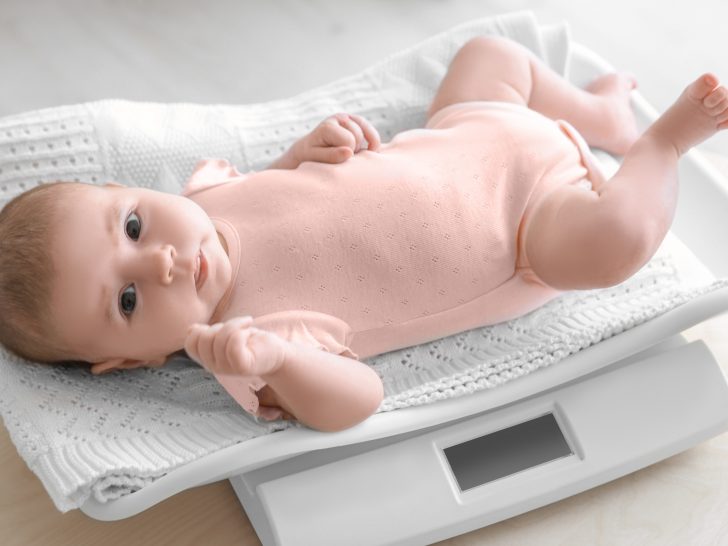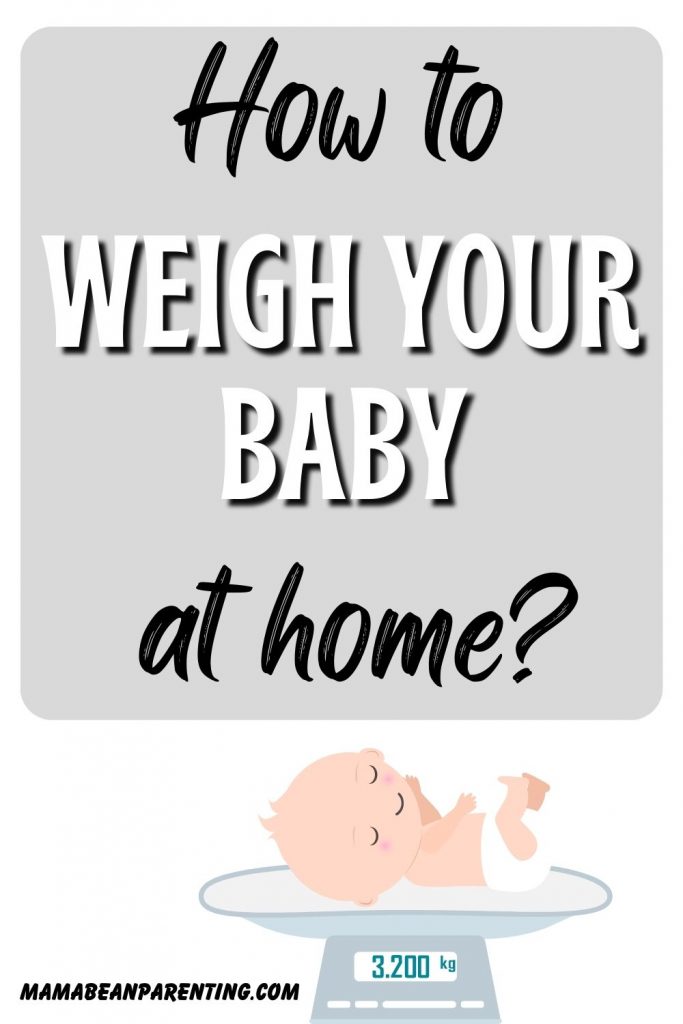Babies are cute, tiny, and adorable, but they’re also like little time wizards.
One minute their palm can be wrapped around your finger, the next they’re reaching for the cookie jar on the kitchen counter. It’s amazing, really, how fast days turn into months.
Try as we might to stop it by cherishing each and every moment, we’re doomed to fail.
Best we can do as parents is to keep track of their growth spurts. By learning how to weigh your baby at home, you can organize your own personal baby growth chart.
With a bit of effort and some know-how, you won’t have to leave your home.
Now, weighing your baby regularly is important for multiple reasons. It’s necessary to ensure that your baby is growing up healthily and getting all the nutrients they need.
So, how do you do it? Is there some special baby scale that you have to use, or does it just take a bit of finesse with an adult scale? Don’t worry. We’ll get you up to speed.
Why It’s Important to Track Baby Growth

Changes – there’s so many of them. It’s hard to keep track. Every day brings something new, and takes away from your baby’s littleness. It’s always exciting – and never boring.
Maybe your baby has just learned to crawl. Maybe they’ve just blurted out their first ‘mama’ or ‘dada’. Either way, it’s a big deal, and you have to keep track of their growth.
Knowing how to weigh your baby at home can help you accomplish exactly that.
Now, why is keeping track of your baby’s weight so important?
By taking the time to weigh your little one regularly, you’re actively monitoring their health and development. This allows you to spot any irregularities or issues early on.
So, if you compare your baby’s weight to what is considered a normal growth pace (which we’ll get into soon), you can breath a sigh of relief knowing that you have a healthy baby.
On the other hand, if you do happen to spot any abnormalities, you can catch potential health issues before they turn into big problems. That’s a big plus in any parent’s book.
As for what the underlying issue could be – that’s for the pediatrician to figure out.
Your job as a responsible parent is to keep track of your baby’s growth.
How Much Should Your Baby Weigh?
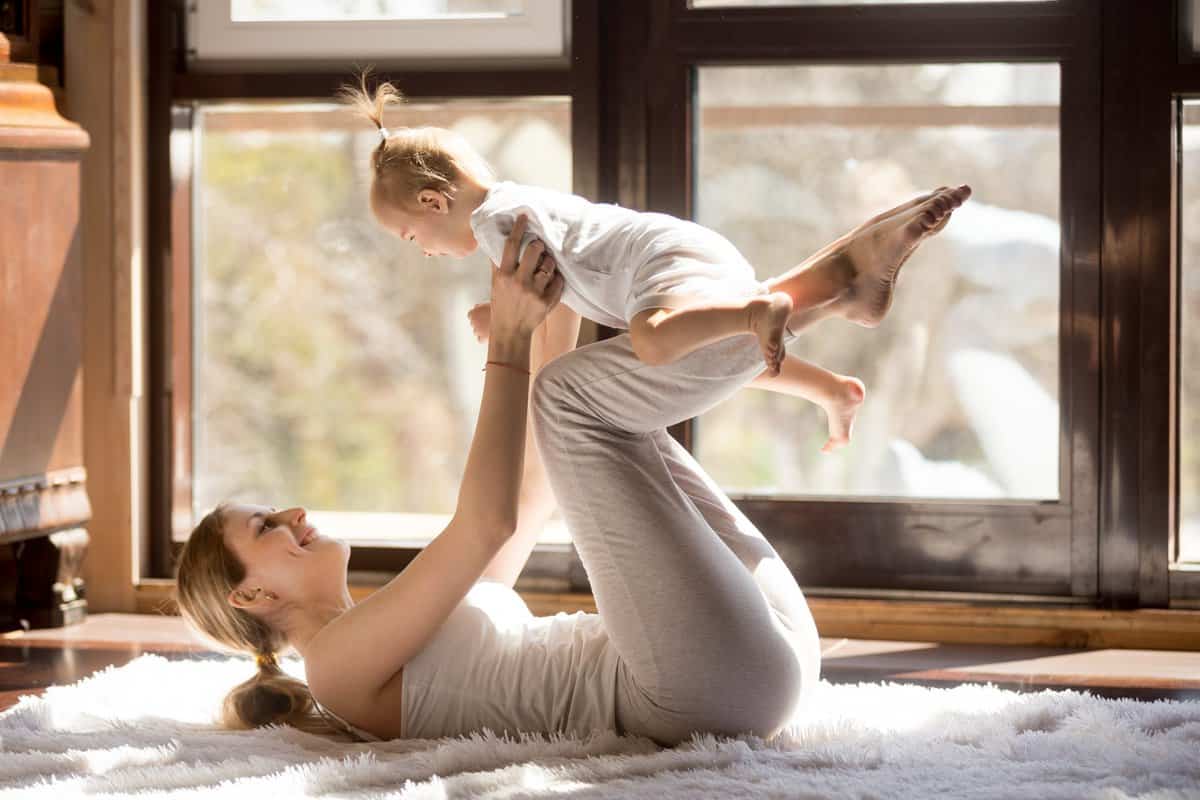
Worry, worry, worry – as a new parent, that’s basically your full-time job. You overthink and overstress things because you want your baby to be perfectly healthy and thriving.
That’s why it’s important to know how much your baby should weigh.
This may sound like it needs a chart, but it’s not so simple. Just like adults, babies come in all shapes and sizes. No need to sound the alarms if your baby is a little smaller or larger.
So, what’s the average weight for a full-term baby?
Well, it’s usually around 7.5 pounds, but don’t get too hung up on that number. Average means exactly that – average. It doesn’t mean that that’s the ideal number for every baby.
Some babies are smaller, some larger. That’s to be expected. So long as your little one is healthy and growing steadily, then you don’t have to worry about their weight too much.
By the time your baby is 6 months old, it will have doubled its weight. That takes us from 7.5 pounds (if we take the average weight of a newborn baby) to around 15 pounds.
On their first birthday, expect your baby to weigh in the ballpark of 20 pounds.
These guidelines are rough and inaccurate if applied on a baby-to-baby basis. As we said, it’s perfectly fine if your baby falls outside of the average range by a reasonable margin.
Also, don’t forget to take into account that baby girls tend to weigh less than boys. But, every baby is unique, so don’t get upset about it if your little girl slightly tips the scale.
The most important thing is that your baby is healthy and eating well.
However, if your baby falls notably short or above the average weight, then it might be worth checking with your pediatrician. They will assess the situation and offer guidance.
That’s why monitoring your baby’s weight is crucial. It allows you to find out on time if there are any issues that need to be addressed, which is super important in the long run.
It’s much easier to deal with a problem if you catch it early.
It allows you to work alongside your pediatrician to prevent smaller issues from becoming big problems later down the line. So, make sure to keep a close watchful eye on your baby.
How to Weigh Your Baby at Home
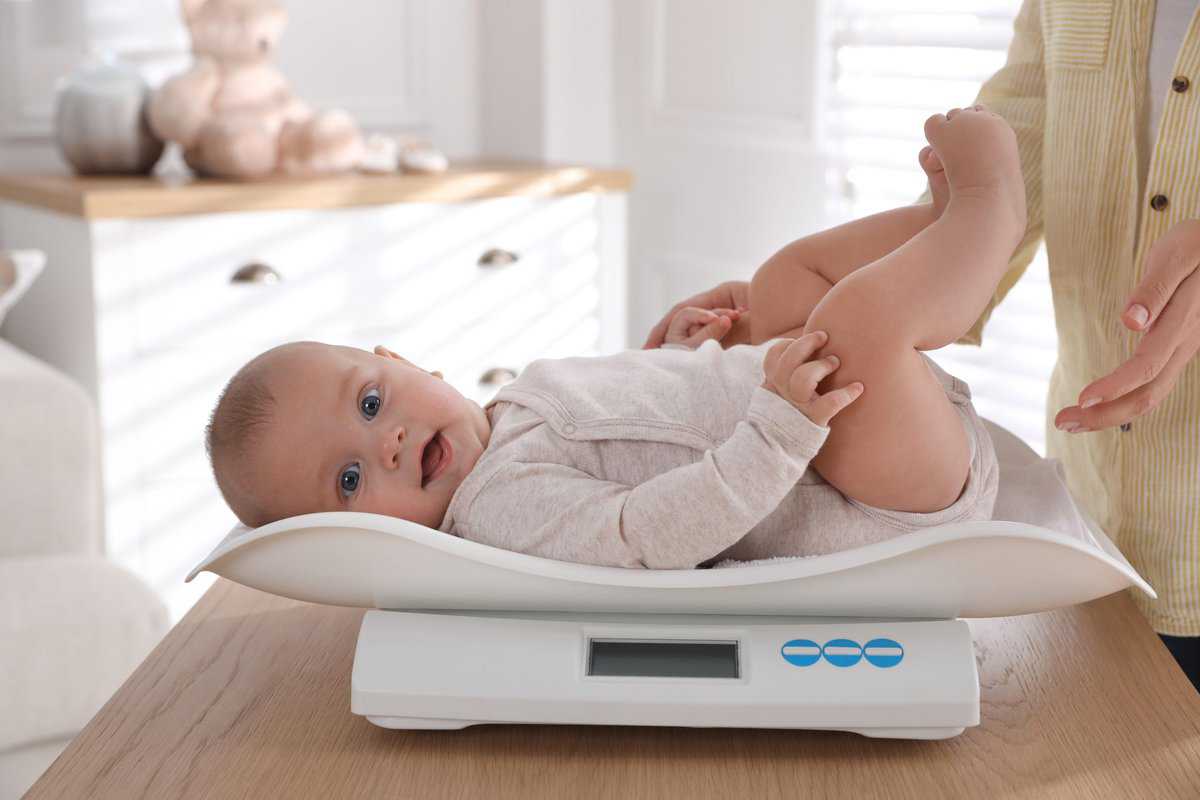
Don’t have the time for a trip to the pediatrician’s office? Maybe you’re just in the mood to stay at home all day in your pajamas, binge-watching your favorite show with your baby.
No need to stress. You can easily weigh your little one at home.
So, how do you go about doing it?
If you want to do it by the book, you’re going to need a baby scale. If you don’t have one, don’t worry. There are other methods that you can try that don’t require fancy equipment.
But, if you do happen to have a baby scale lying around, then you’re all set.
Whether you’ve bought one online or purchased a baby scale from a medical supply store, it’s important to double-check that it’s completely accurate and reliable before you use it.
When you’re ready, find a good spot for the scale. Any flat and even surface will do.
Make sure it’s out of the way of any potential hazards or anything that could possibly disrupt your weighing mission, like pets or older siblings that can’t help but interfere.
After you’ve placed the scale on a flat and even surface where you and your baby can focus on the task at hand, proceed by taring the scale. That means resetting it to zero.
Then, undress your baby. Clothes add weight, and when it comes to your baby – every ounce counts. So, make sure that your baby is fully naked before you position them.
That’s your next step. With the clothes out of the way, gently place your baby on the scale. Wait for them to calm down. Read and write the number down – don’t memorize it.
You would be surprised how easy it is to forget the weight of your baby as soon as you pick them up. It happens more often than you think. So, make sure to write it down.
If this is your first time weighing your baby, it’s a good idea to start a baby weight chart right away. You can just grab any old notebook and jot it down for future reference.
However, if you’ve already weighed your baby in the past, calculate how much weight they have gained in the meantime. This helps you keep track of your baby’s growth.
That’s basically all you have to do. It’s very simple and convenient.
But, what if you, like so many other parents, don’t have a baby scale at home?
Weighing Your Baby Without a Baby Scale
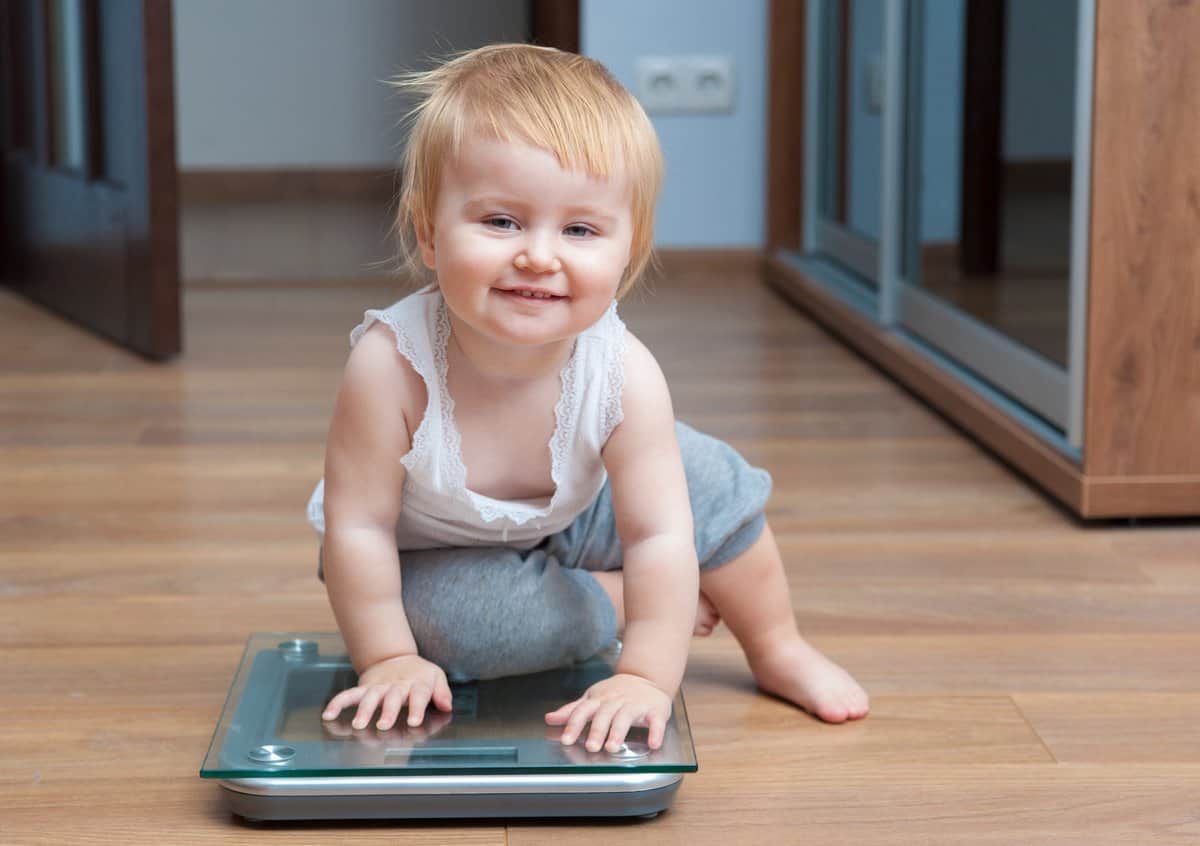
There’s no need to panic if you don’t have a baby scale at home. Many parents don’t. Even if you’re not planning on getting one (they tend to be expensive), there are alternatives.
• Bathroom scale
The good old bathroom scale can be a neat substitute to the baby scale.
While you may not have a baby scale at home, chances are that you have a trusty digital bathroom scale lying around somewhere that you can use. Practically everyone has one.
Let’s get you up to speed on how to weigh your baby at home using a bathroom scale.
It’s very easy, but the results aren’t as accurate. Sure, it’s not going to give you the exact weight, but it can still provide a rough estimate – and sometimes that’s good enough.
So, how do you go about using it?
Here’s how simple it actually is. Weigh yourself first. Then, weigh yourself again holding your baby. Finally, subtract your weight from the weight of you and your baby.
That’s all there is to it. You now have a rough estimate of your baby’s weight.
While you don’t get the complete accuracy of a baby scale by using alternative methods, they still remain viable and convenient options. A few ounces don’t make a big difference.
One last thing: always make sure to place the scale on flat and even ground in order to get the most accurate measurement possible. Uneven surfaces give out false readings.
• Kitchen scale
If you don’t have a baby scale or even a digital bathroom scale – what about a kitchen scale? It’s a common household item and, if you have one, useful for weighing babies.
As opposed to the bathroom scale, this one is a little bit trickier to use.
First, you need to check if the scale has a tare function. If not, this method won’t be viable, unfortunately. But, if it happens to have one, then you’ve hit a stroke of luck.
The reason why you need a tare function is that you’re going to be using a container. Yes – a container. Why? Take a closer look at your kitchen scale. Your baby just won’t fit.
So, a container is required to get an accurate reading.
When you find a container that’s big enough for your baby, and comfortable, too, place it on the scale. Then, hit the tare function in order to override the weight of the container.
Place your baby gently inside the container when the scale has been reset to zero.
Be patient until your baby stops squirming.
And there you have it – the results are in. Unlike the bathroom scale, you’re sure to get more accurate readings, down to the ounce. However, there are some safety concerns.
What if your baby can’t stay put and accidentally tips over with the container?
Make sure to be extra careful.
How Often to Weigh Your Baby

There are a few types of baby scales that you can use to weigh your baby – but how often should you do it? First of all, keep in mind that it’s normal for newborns to lose weight.
During the first few days after birth, your little one may lose some weight, and that’s why it’s important to track their progress during this time to see if they’re gaining back weight.
This is essential if you’re doing weighted feedings.
What about after the first two crucial weeks?
Even though there are no rules set in stone, it’s generally advised to continue weighing your baby at least once a month. This allows you to monitor their health and progress.
If you have any concerns about your baby’s weight gain, consult a pediatrician.
Just don’t obsess about it too much. Don’t panic immediately if your baby’s not gaining weight as quickly as you expected. Every baby is different; as such, weight gain varies.
If you’re too worried about it, have a talk with your pediatrician. They can help you assess the situation, determine if there are any health issues, and reassure you that all is well.
After your baby turns 6 months old, you can switch from weighing your baby once a month to once every two months. At 12 months old – once every three months.
Still, when you learn how to weigh your baby at home, you can do so as much as you want. It’s not harmful for your baby, and if it gives you some peace of mind – go for it.
How Fast Do Babies Gain Weight?
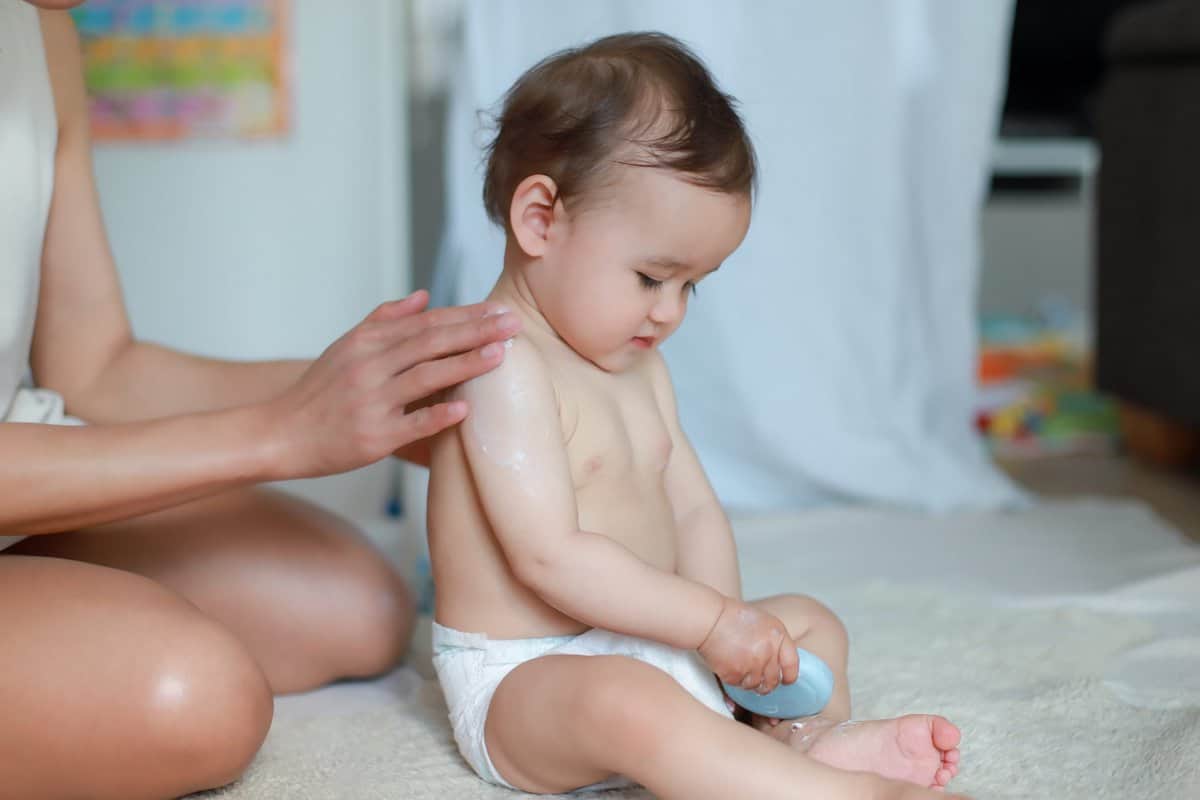
Babies must be hiding growth potions somewhere because it’s crazy how fast they grow up. Every day they get a bit taller and bigger. Before you know it, they’re paying bills.
It can be frustrating to watch as a parent because you barely get enough time to cherish their littleness.
That raises the question of how fast babies gain weight, anyway?
By using a digital scale at home to weigh your baby, you will figure out how much your baby weighs, but how do you actually know how much weight your baby should gain?
Well, during the first 6 months, babies are in a heck of a rush to grow up. So, your little one is going to gain weight rapidly, somewhere in the ballpark of 5-7 ounces a week.
As always, we have to note that this varies on a baby-to-baby basis.
But what about after the first 6 months? That’s when their weight gain slows. So, don’t be surprised if your baby’s weight gain slows down a bit after the initial growth spurts.
That’s nothing to worry about.
If you’re comparing your child’s progress with a weight gain chart, for example, it’s important to remember that your baby probably won’t match it down to the ounce.
Every baby is different. Also, genetics play a crucial part in how your baby grows.
Even though it’s useful to use baby scales at home to measure your baby’s weight, you still have to see a pediatrician every once in a while to ensure your little one’s health.
What if Your Baby Starts Losing Weight?
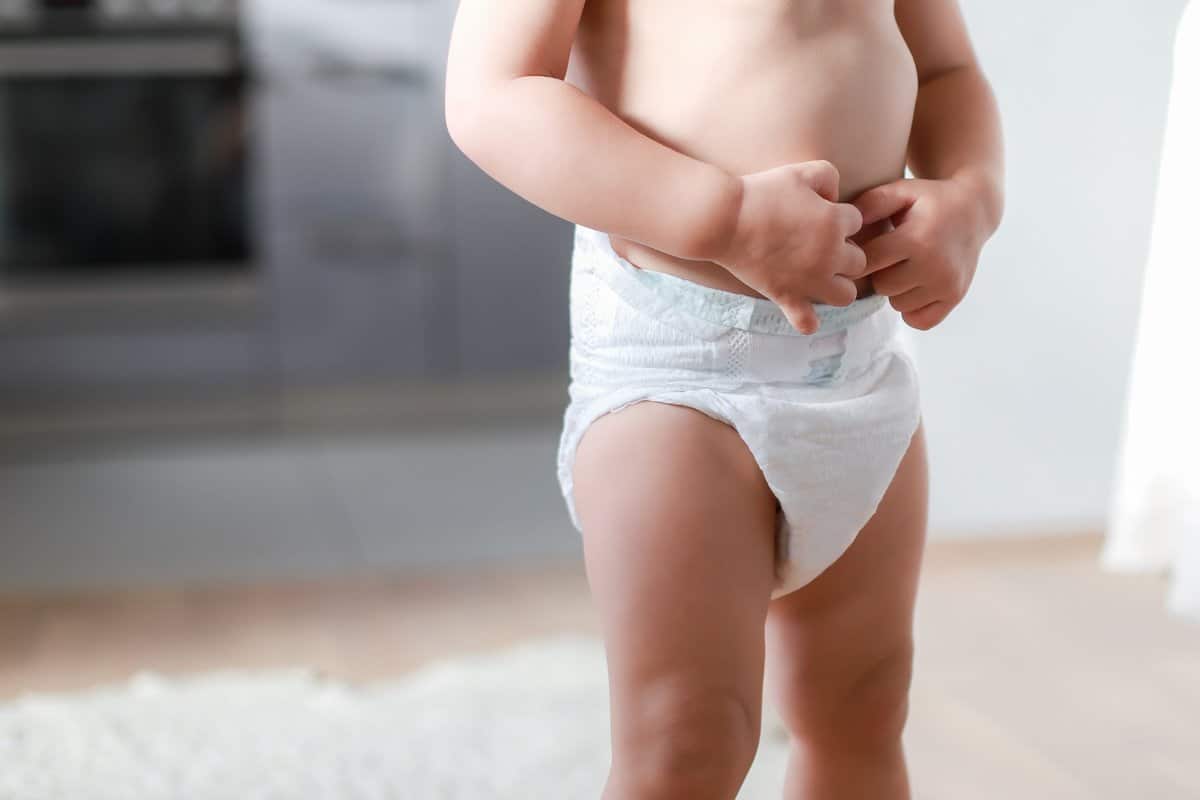
Before you slam the panic button, here’s what you need to know.
It’s expected for babies to lose a little weight (not over 10%) after being born.
But, what if their weight loss continues? When babies lose too much weight or fail to regain weight after the first two weeks – it’s important to talk with your pediatrician.
Something’s obviously not going well, and you need to solve it with professional help.
Your pediatrician will assess the situation and provide viable solutions, such as treatment in case of an underlying medical condition or a different feeding strategy for you to try.
As a parent, you’re always worried, but it’s hard to pinpoint the exact cause. That’s why you need to seek professional guidance as soon as you notice your baby losing weight.
It doesn’t matter when it happens. What matters is responding in a responsible way.
The most common cause is usually improper feeding habits. Maybe your little one isn’t getting enough breast milk or formula. If so, you may have to alter your feeding habits.
Switching things up may lead to more favorable results.
On the other hand, it could also be due to an underlying medical condition. This involves various things that parents can’t figure out on their own. Talk with your pediatrician.
Don’t let this upset you because, in most cases, it’s just weight fluctuations. Not all babies follow the same development path. So, your little one could just be growing differently.
Still, it’s always the best choice to seek professional help if you’ve got any concerns.
This is sure to give you peace of mind.
Is Your Baby Gaining Too Much Weight?
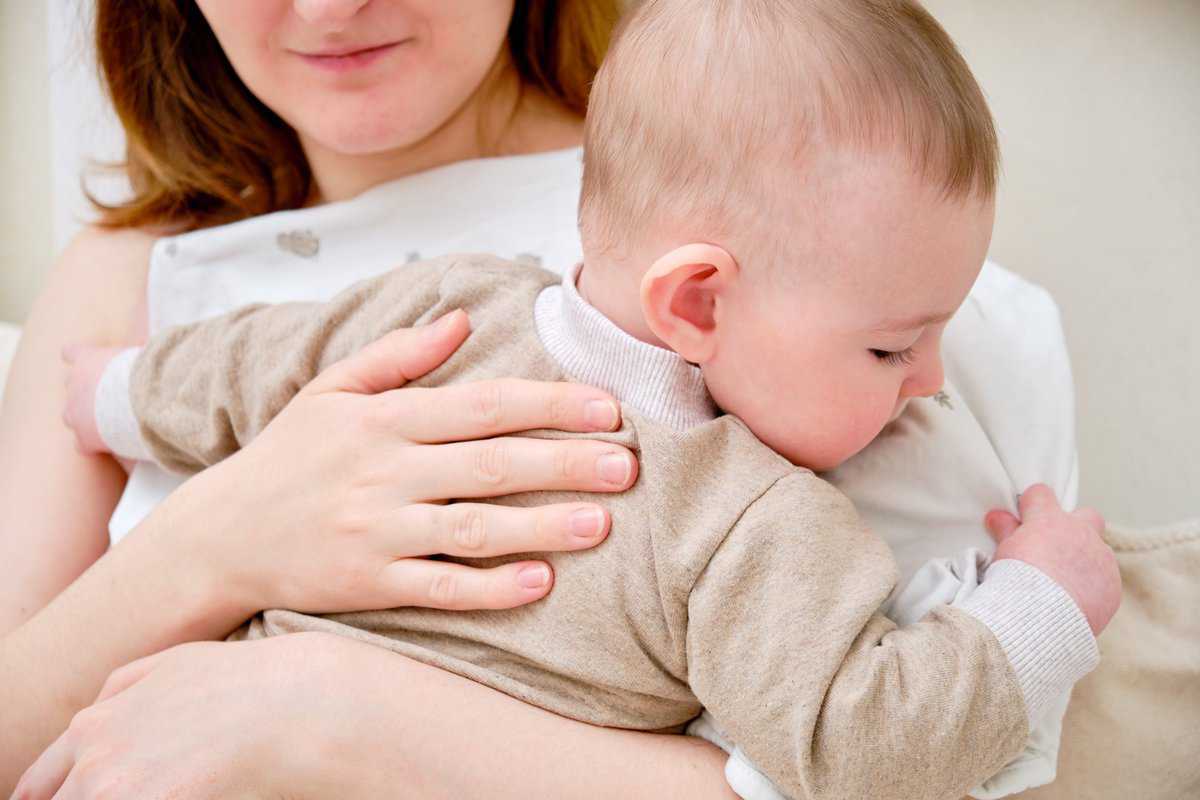
What about the other side of the coin?
If you’re staying on track of your child’s growth by using a scale to weigh your baby at home and you notice that they actually have too much baby weight – should you worry?
Well, that depends. When was the last time you weighed your little one?
Maybe they’ve had a growth spurt and packed on a few extra ounces if it’s been a while.
However, if your child has been gaining weight fast and consistently, then it might be a good idea to talk with your pediatrician because the excess weight in babies is dangerous.
It could cause your baby to surpass the crib’s weight limit.
Your little one is, well, little – and excess weight can be hard on their bodies.
By using scales to keep track of how much your baby weighs, you can compare the numbers to various growth charts in order to determine if they’re staying on track.
Keep in mind that a slight difference isn’t anything to worry about.
All babies grow and develop at their own, unique pace.
Still, if there’s a noticeable difference, don’t panic – just give your pediatrician a call. They will tell you the cause and offer helpful tips to get your little one back on track.
It could be the common case of overfeeding. Sometimes, it’s just plain old genetics.
In certain cases, however, excess weight could indicate an underlying medical condition. That’s why it’s important to seek professional guidance if you notice anything unusual.
Your child is all cute and cuddly, but a healthy lifestyle begins as soon as they’re born. So, stick to a balanced feeding schedule and keep monitoring your baby’s growth.
How to Avoid Common Mistakes

Using scales to weigh your baby at home sounds easy, and sure, sometimes it is, but it’s also easy to make common mistakes if you’re not careful or if you’re not paying attention.
Just when you think you’ve gotten the hang of it and mastered the ever-delicate art of weighing your baby at home – you leave their clothes or a diaper on by accident.
When you use a scale to weigh your baby, you don’t want to forget about the details.
Sure, a diaper doesn’t weigh that much, but neither does your baby. You want to get the most accurate number possible, and the only way to do that is to weigh your baby naked.
Now, the next thing you have to double check is that your scale of choice is accurate, especially if you’ve got an old one. Do a few tests to see if it displays reliable results.
If so, you’re good to go. But, there are other details, as well.
Are you using different scales to measure your little one? If you’ve used, for example, a kitchen scale last time and now moved on to a bathroom scale – the numbers may differ.
If you want to do this at home, weigh your baby consistently with a single scale.
It might not seem obvious at first, but it’s important you get the timing right. So, weigh your baby at home before feeding them or two hours at the very least after feeding.
Try it out yourself, if you don’t believe us. Weigh your little one multiple times in a single day and you’re always going to get different results, due to fluctuations in body fluids.
Another thing to keep an eye out for is to clean the container if you’re using a kitchen scale to measure your child. Take the time to ensure that everything is neat and clean.
Also, don’t forget that babies tend to get a little squirmy – and that’s putting it mildly. You need to be patient when you’re using scales at home. Weigh your little one carefully.
The last thing you want is for them to accidentally fall from the scale. Your little one might be a bit uncooperative, and if that’s the case, you need to stay calm and relaxed.
So, mind these tips and you will do just fine. But, don’t forget that it’s perfectly normal if your child doesn’t fit the charts down to an ounce. That doesn’t mean there’s an issue.
No two babies are the same when it comes to their weight.
In Conclusion
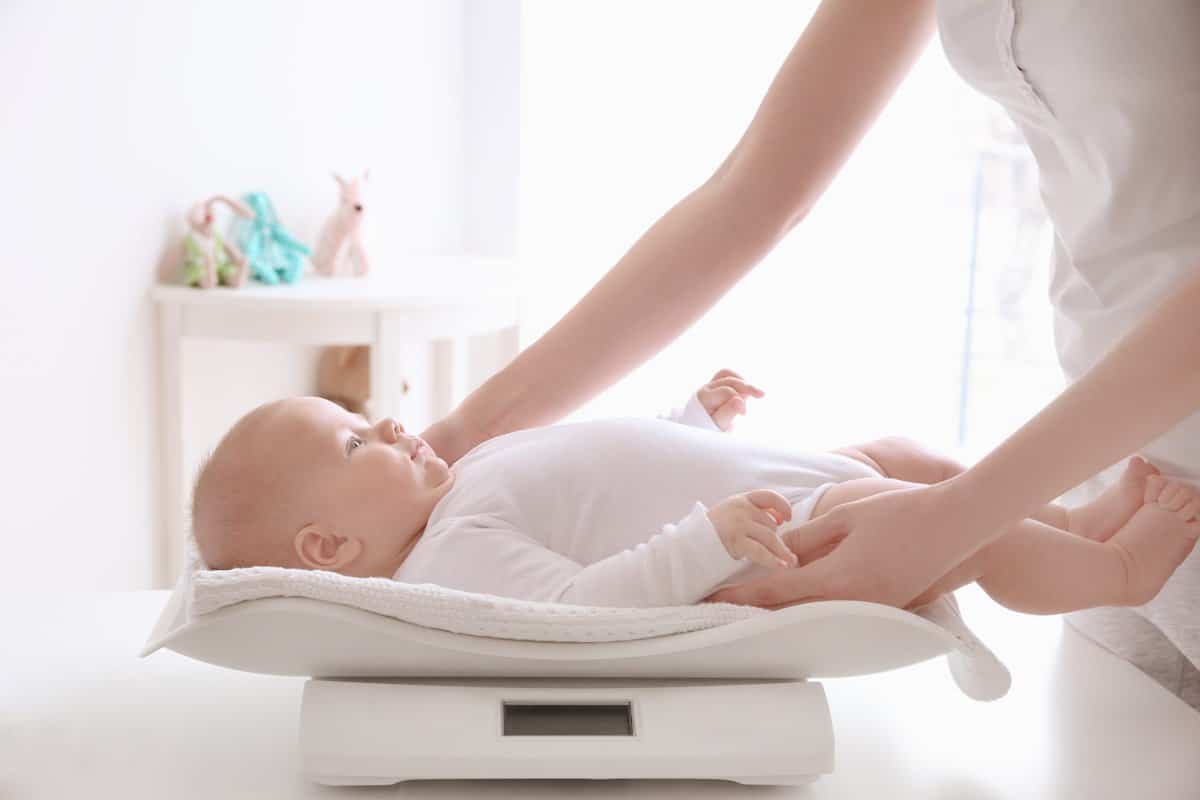
If you just don’t have the time or if you don’t feel like going to the doctor’s office to weigh your baby – you don’t have to. You can do it all from the comfort of your home.
And now you know how. It’s not difficult, not one bit. It just takes a little bit of know-how and, well, a bathroom or a kitchen scale. Can’t exactly measure without using scales.
If you don’t have one, you’re going to have to purchase one. Either that or putting on your shoes and taking a little trip to the pediatrician’s office with your angel in tow.
There’s also the option of going online, looking at scales and ordering the one you want. If you’re mainly set on monitoring your little one’s progress – this is your best bet.
Just try to remember not to sweat the small stuff. Having a baby will surely make you reel with questions, but there’s no need to panic if your baby’s weight is a little off.
That’s normal. Babies have their own pace. So long as everything is working out fine and so long as your little angel is staying healthy, you don’t have to worry yourself to death.
Enjoy the journey, but keep improving as a parent.

Mother of three and a primary school teacher. I’ve always loved being around children and helping them, so I chose my path as a teacher. It is sometimes hectic with three children, but I am 100 percent into it and wouldn’t change it for anything in the world.

